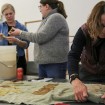Plant Reproduction with the Nicholas McLetchie Lab
Biologist Nicholas McLetchie, and Ph.D. students Jonathan Moore and Rose Marks, study sexual reproduction of nonvascular plants like liverworts and mosses. In these species, it’s common for females to far outnumber males, and the lab team wants to figure out how and why.
McLetchie noted a recent discovery when they manipulate the environment. “One of the things we’ve figured out is we can make both males and females reproduce within 21 days. We really don’t understand the mechanism, yet,” he said.
Moore discussed how important water is in the plant’s reproductive cycle, but how its job differs based on the sex of the plant. “Females need to get water, because they’re water fertilized and males need to lose water to disperse their gamets to the females,” said Moore, “So what makes them a good male, may also make them more likely to die.”
Marks, who just returned from field work in Trinidad with McLetchie, is working on her dissertation project investigating what genes allow plants to survive without water, a topic relevant to many areas of the world with persistent drought conditions. “We’re looking at the ecology of plants that are drought or desiccation tolerant, as well as the molecular mechanisms,” she said.


